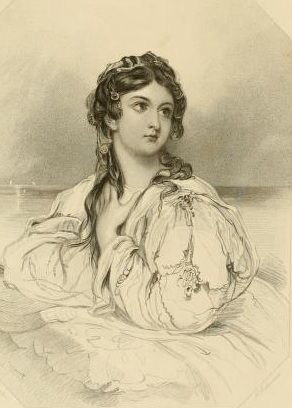| directory |
| home | contact |
|
|||||||||||||||
| search | |||||||||||||||
The Shakespeare Sisterhood: DesdemonaThe type of all gentle and refined beauty -- "O, the world hath not a sweeter creature!" -- Desdemona by her rare simplicity, her childlike artlessness of character, wins her way to the hearts of all who have conned the story of her woes and mourned her cruel fate.In our own mind we class her naturally with Miranda and Ophelia; but she is less purely ideal than either of these; her dramatic condition differs from theirs in being simply domestic; though highly picturesque, it is dependent for its interest on no more romantic accessories than are afforded by the privacy of a sumptuous household, to the skilful management of which -- notwithstanding that she was "an admirable musician," and of "high and plenteous wit and invention" -- she does not scorn to devote a considerable portion of her time. With whatsoever of intense effects her married life is produced, herself is never part of them -- she, indeed, constitutes their principal figure, but she is never involved in them, never understands them; her identity is preserved intact throughout. Subordination, in thought and word and act, is the prominent feature of Desdemona's character: not simply the non-resisting humility of a weak, spiritless nature, but that honorable submission to one having authority (whether God, king, father, or husband) which, then, as in the later day of English Margaret More, formed an essential part of the education of the gently bred, only less important than religion itself, or, rather, included in that. That Desdemona is not necessarily tame because her "spirit, so still and quiet," has been chastened by a graceful discipline, is proved by the boldness with which she takes her fate into her own hands when the occasion demands prompt action. Disdainful of the "wealthy, curled darlings of her nation," she hearkens to and loves the gallant Moor, to whom "the flinty and steel couch of war" was "thrice-driven bed of down;" and with the courageous delicacy of a true woman, she discovers her love to him who, last of all, would dream of winning it: She thanked me;and they elope and are married. Again, no woman of meagre intellectual endowments -- and as such Desdemona is too often regarded -- or without sufficient of what we term character, could, with such force and graceful logic, have defended the step she had taken, in the presence of an august senate, which, of itself, would have overwhelmed the soft, timorous Desdemona as she exists in the popular imagination. ....There is nothing in all Shakespeare, to our mind, more affecting than the final night-scenes in this moving tragedy: the half-prescient sadness of the victim; her request, full of poetic pathos, to Emilia, to lay on her bed her wedding sheets, and, if she should die, to shroud her in one of them; the chanting of an old song which she had heard, long back in her childhood, sung by her mother's maid, who died of love -- are all, from their sweet tinge of superstition, most touchingly effective. In her conversation with Emilia, while disrobing for bed -- that bed which is so soon to be her bier -- the extreme delicacy of Desdemona's mind, the spotless chastity, which cannot be persuaded of the existence of a grossness so foreign to itself, is strikingly contrasted with the loose opinions, the coarse good sense, and the easy virtue of Iago's wife; it is the crowning beauty of her blameless life. How to cite this article:___________ Related Articles
|

|
©1999-2021 Shakespeare Online. All Rights Reserved.